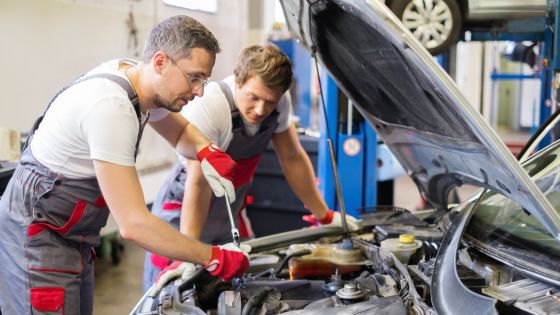If you want to ensure safety, then you must maintain your car regularly. It also helps with the longevity of your vehicle. In order to prevent sudden breakdowns or accidents, proper maintenance is required. There are some unfortunate times when an accident cannot be avoided. You should reach out to a car accident lawyer to see what options are available to you. We have put together some of the most essential car maintenance tips for you so that you are able to drive safely on the road!

Essential Car Maintenance Tips for Safety on the Road
1. Check Tread Depth and Tire Pressure
When you are driving, the stability and traction of your car must be in good condition. Getting your tires properly maintained can help with that and also enhance the overall safety of your car. Use a tire pressure gauge and make sure that the pressure matches the recommended levels by the manufacturer. If your tires are not inflated properly, it can increase the risk of a blowout.
Checking the tread depth of your tires is also just as important since it helps you maintain a proper grip on the road surface when conditions are slippery or wet. Bald tires can significantly weaken your vehicle’s ability to safely maneuver and brake.
2. Inspect the Brakes and Brake Fluid
To ensure optimal performance, it is important to regularly check the condition of the brake fluid, rotors, and pads. If your brake fluid is contaminated or just low, you are more likely to face a brake failure. Additionally, you will notice increased stopping distances and lower braking efficiency if the brake pads in your vehicle are worn out.
Here’s a tip:
Try looking out for unusual noises. If you notice a spongy or soft brake pedal feel, check your break system.
3. Maintain the Level of Fluids
You need to check and maintain the levels of several different fluids. These include
- Windshield washer fluid
- Power steering fluid
- Transmission fluid
It is crucial to maintain all these fluids. Since they play a significant role in operating, cooling, and lubricating several different components.
If your vehicle’s fluids are contaminated or low, you will face different types of issues. Either replace the fluids or fill the tanks up before they run too low so your vehicle runs smoothly.
4. Replace Damaged or Worn Wipers and Lights
Having good visibility is important for a safe drive, and it becomes even more important when you encounter challenging weather or low-light environments. Ensure your windshield wipers are not damaged. It will help you drive safer, even if it is foggy, snowy, or rainy outside. If your wiper blades are worn out it will also impair your visibility on the road ahead.
It is also necessary to check all of your vehicle’s exterior lights, including brake lights, headlights, turn signals, and taillights. If the lights are functioning properly, the chances of an accident are reduced.
5. Schedule Routine Inspections and Maintenance
Perform regular maintenance tasks on your vehicle yourself. With professional help you are able to address any potential issues.
Technicians or mechanics usually check several different components of your vehicle. These include exhaust systems, suspension, belts, filters, hoses, and steering. They can also run some diagnostic tests to check for any underlying issues.
Conclusion
Maintaining your safety, as well as the safety of other people on the road comes down to ensuring your vehicle is driving in good condition. You can prevent expensive repairs, sudden breakdowns, and accidents by following the tips that we listed above and having a fun driving experience. Make sure you do routine inspections, tire maintenance, and fluid checks so that your vehicle can keep driving at its optimal state!
